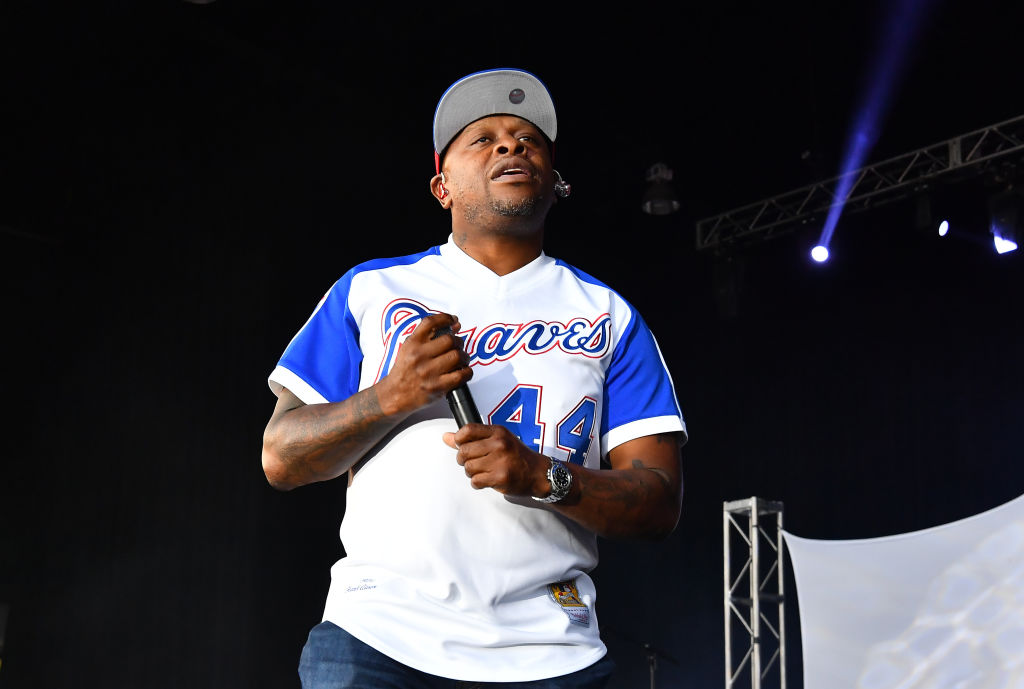Scarface Says Farewell In Final Performance As Houston’s Original Gangsta
Source: Paras Griffin / Getty
There is no one unique story revolving around Brad Jordan.
At 51, the multitude of statements, anecdotes and fondness of Houston’s first true and wild rap superstar could fill a book or two. Even with Scarface’s “Diary of a Madman” autobiography, some stories somehow passed on and grew in the last few years. Yet when you speak with him, he’s still the gravel voice jokester with a dark sense of humor and a wide-open view of the world and the city he inhabits.
On Friday, Nov. 12, Mr. Scarface took one final bow on stage at the House of Blues. The show, announced via his “Geto Boys Reloaded” podcast with Willie D, is a swan song. It’s asking to pack nearly 30 plus years of history, themes, mythology and more into one night. It will ultimately succeed because somehow, someway, Brad Jordan has beaten death (he attempted suicide as a child), COVID, a stint in a mental health facility, the criminal justice system and is credited with being among the first to introduce mental health, depression and more to hip-hop. He’s Houston’s original microphone gangster.
“The cool part about it is, I get to say farewell twice,” he told Willie D. “I get to go out there and say farewell by myself, and then I get to say it with you.”
The accolades for Scarface are immeasurable in terms of Houston hip-hop, much less the South. He’s the first Houston rapper to have a No. 1 album with 1997’s “The Untouchable.” “Minds Playing Tricks On Me” with The Geto Boys, released in 1991, introduced the world to a slice of Houston and the recurring characters of paranoia and frustration in his life. “Damn It Feels Good To Be A Gangster” means two different things for two different sects of America. “The Fix” and “The Diary” are among two of the culturally revered Houston rap albums of all time. He’s recorded with JAY-Z and Nas. His collaboration with Tupac Shakur on “Smile” was one of the last songs Pac recorded before he was fatally shot in Las Vegas in 1996.
According to J. Prince, Rap-A-Lot founder and the one label figure who remained a constant in Face’s career, the plans for “Smile” initially didn’t include Tupac.
“On ‘Smile,’ the interesting thing… that record didn’t go like I really wanted it to go,” Prince told the “Rap Radar Podcast” in 2018. “Because I wanted Biggie [Smalls] on that record. I went to Puffy after Pac had got killed. I went to Puffy and asked him if Biggie could be on that record. Of course, at the time, he told me that Biggie didn’t want to. ‘Cause I told him I had a verse from Pac. He didn’t want to be connected. I can only imagine what that would have turned out to have been if I could’ve had that verse. That would’ve been [one of Biggie Smalls’] last verses too.”
Still, the song became part of more Scarface lore, much as how the bleak and paramount 1994 album “The Diary” put Face on a different stratosphere than other rappers within the city. Through a catalog built off his word, tenor and demeanor, the rapper who once ran for city council and ran through the hallways of Willowridge High School became a legend – your favorite rapper’s favorite rapper.
“It’s a beautiful thing when you’re able to express yourself with words and people fall in love with your ability to deliver a story.”
Throughout his storied career, the one thing Face felt was human. Mr. Scarface was a touted persona, and he grimly waded through the world in a suit as if he were Houston’s grim reaper now and then. But songs like “F*ck Faces,” “Mary Jane,” “It Ain’t” and “In Between Us” gave a mix of gravity with occasional hedonism and candor. Have a conversation with him; it’ll detour beyond rap and dive into bands of his youth.
His first album was Boston’s self-titled debut with “More Than A Feeling” having a chokehold around America for ’70s joy. He’ll talk about wanting to dive deeper into the blues or even pull out a guitar and play some notes. It’s why there’s a finality to him when he speaks of rapping as his 2015 album Deeply Rooted and 2017 follow-up Deeply Rooted: The Lost Files will likely be his final complete projects. Revisiting the past, even the moments which birthed his most significant pieces of music can’t be replicated.
Nor does he want to.
“I was saying some good sh*t,” Face told Willie D. “I probably could never write like that again. But it’s a beautiful thing when you’re able to express yourself with words and people fall in love with your ability to deliver a story.”
Over the last few years, even as he’s remained in stasis and branched out further as a public member of the community, his humanity continued to be tested. A bout with COVID-19 in March 2020 would lead to him suffering kidney failure and needing a transplant. His son Chris stepped up, and in September, Face got a new lease on life. It’s what made Friday night more of a victory lap, the culmination of decades of work and simple living.
“If you really want to go, dying is the easy part,” he mused at the end of the first chapter of Diary of a Madman. “It’s the living that’s hard. That sh*t takes a lifetime. And it will test you every step of the way.”
See Also:
Houston Rapper Scarface Recovering From Successful Kidney Transplant After Beating COVID-19
[ione_media_gallery src=”http://blackamericaweb.com/” id=”1386937″ overlay=”true”]

